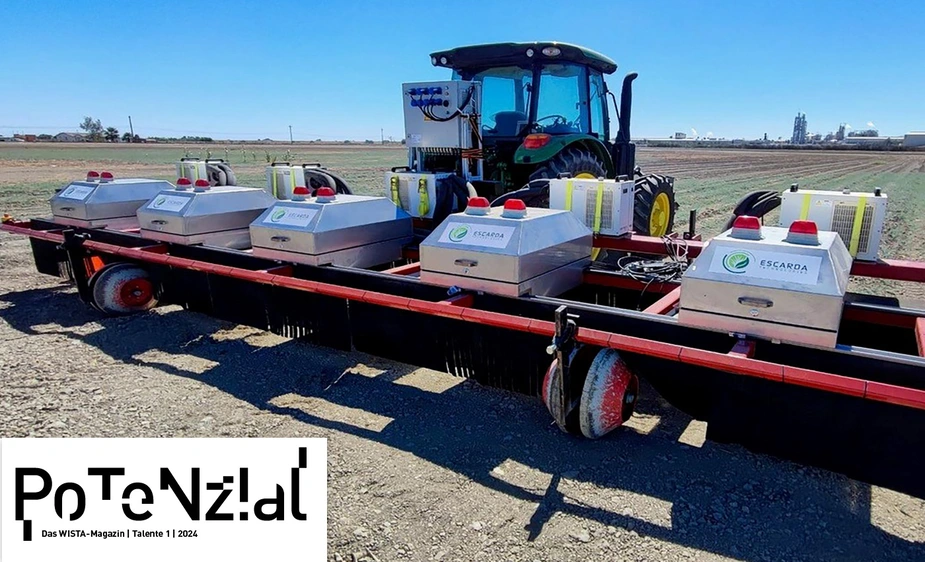Lasers on the field
Escarda Technologies GmbH is developing an herbicide-free alternative for weed control at CleanTech Marzahn
Weed control using herbicides has many disadvantages: It costs worldwide agriculture a good 15 billion euros every year. This trend is increasing sharply, threatening biodiversity, and contaminating foodstuffs and groundwater. The start-up Escarda Technologies GmbH at CleanTech Marzahn is now pushing forward with a high-tech alternative based on artificial intelligence.
To the human eye, the young plants are almost indistinguishable. Especially viewed from a modern tractor at high speed. In contrast, the AI-based image processing system of Escarda Technologies GmbH can distinguish the tender shoot of a crop plant from a fast-growing weed in fractions of a second. Once identified, the weeds don’t stand a chance. Using a scanner, the system focuses a laser towards its growth centre while balancing out all vibrations. A short pulse of a few milliseconds is enough. “In the race for growth with the adjacent crops, the absorbed light weakens the weed to such an extent that it can’t keep up,” explains Julio Pastrana, founder and CEO of the start-up, which was founded in 2019.
The patented Escarda technology is the result of intense research work lasting a decade. Pastrana has pushed it forward at the universities of Hanover and Bonn and decided to found his own company in the mid-2010s. With the help of an EXIST Business Start-up Grant, he set up the initial structures to translate the AI-based laser procedure into a marketable product. An interested investor was found at a pitch, who has since been closely aligned with the start-up—and persuaded Pastrana to move to Marzahn, a so-called Zukunftsort, one of Berlin’s locations where future innovation is generated. Berlin.Industrial.Group. (B.I.G.) operates a campus there that houses a wide range of companies focusing on laser technology and photonics.
To base Escarda at the CleanTech site was a perfect fit. They deal with organic farming, healthy nutrition, environmental protection, and the preservation of biodiversity. When lasers are used for weed control, herbicides are no longer needed. “We already have several customers in Europe and the US, who use our system for large-scale cultivation of organic vegetables,” says Pastrana.
He shows videos of tractors driving across gigantic fields equipped with an eight-metre-wide contraption and laser systems attached to it. The founder scrapped original plans to integrate the systems directly into autonomous vehicles due to the ensuing excessive expenditures. The safety tests for the lasers alone are quite demanding. People in agriculture appreciate if they can carry out as many tasks as possible with several implementations in one pass. It’s all about efficiency, speed, and system reliability.
Pastrana leaves nothing to chance. With a team that has now grown to ten employees, including students, he is training the artificial intelligence based on images from databases to reliably identify different regional weed species at various stages of their development. “We have now reached the point where our AI is robust enough to learn independently under human supervision,” he explains. This type of semi-supervised learning is the preliminary stage to self-supervised learning, when AI is able to distinguish plants adaptively and independently. It then learns with each pass over the field.
As yet, Pastrana is searching for new investors. Other providers, too, are now pushing forward with laser-based, herbicide-free weed control. “We want to accelerate our growth and win over additional worldwide customers for our solution,” he says. He has a clear vision for the future of his Escarda Technologies GmbH. If this approach proves successful in organic farming—where it often competes with tedious and costly manual weed control—it is sure to conquer conventional agriculture sooner rather than later. In addition to the aforementioned disadvantages, herbicides are a real cost factor for farmers. This world market had a volume of 15.5 billion dollars before the prices rose by more than a quarter last year. Faced with increasingly stringent environmental regulations and increasing costs for herbicides, procuring the weed lasers is likely to pay off very soon.
Peter Trechow for Potenzial
Escarda Technologies - Weed Control System

